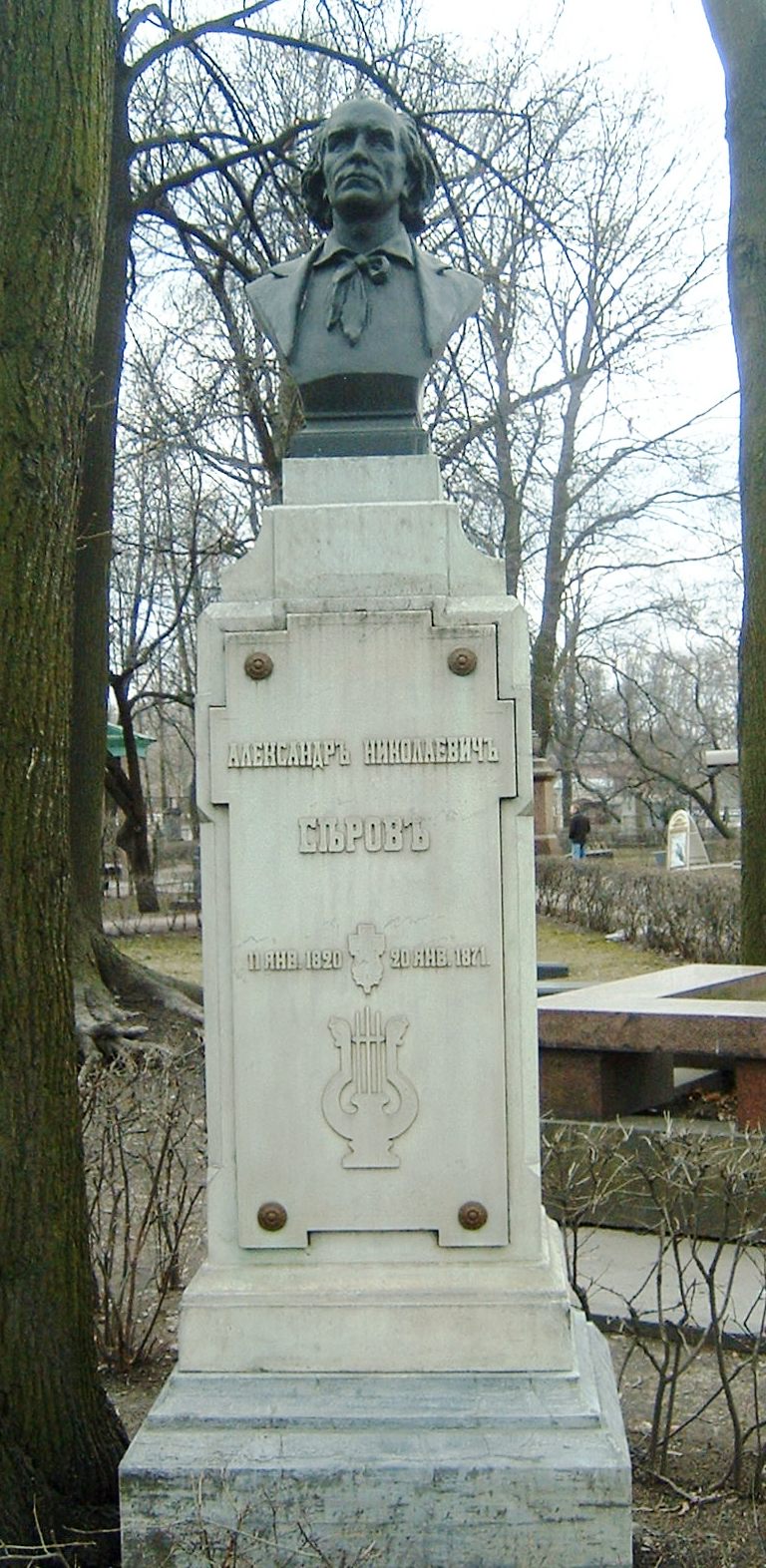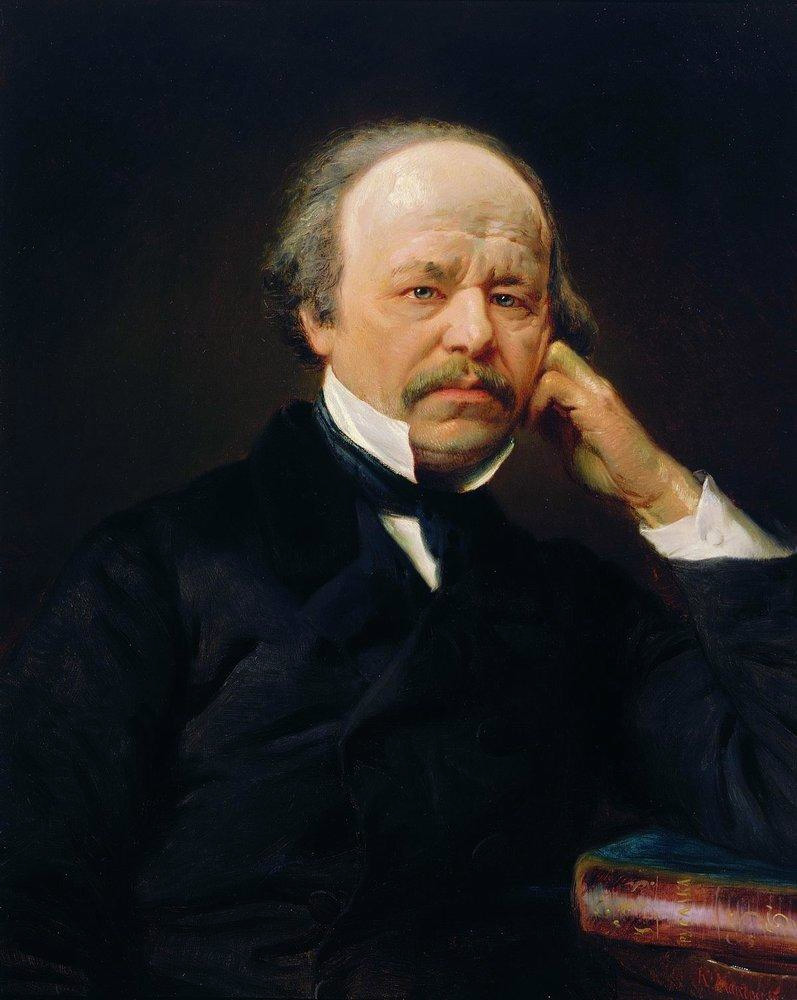|
Osip Petrov
Osip Afanasievich Petrov (russian: link=no, Осип Афанасиевич Петров, ) was a Russian operatic bass-baritone of great range and renown, whose career centred on St Petersburg. Biography Osip Petrov was born in Yelisavetgrad (now Kropyvnytskyi) in Ukraine, then part of Russia. He started his career by singing in a church chorus. Petrov then worked in Russian provincial theaters (including Poltava, where he worked together with Mikhail Shchepkin). From 1830 until his death in 1878 he worked for the Mariinsky Theatre, St Petersburg. His career was one triumph after another, and he created a number of important roles in Russian operas, by composers such as Dargomyzhsky, Glinka, Mussorgsky, Rimsky-Korsakov, Anton Rubinstein, Tchaikovsky and others. His 50th anniversary as a singer was the cause for national celebration. On 21 April 1876, on the stage of the Maryinsky Theatre, he was presented with a gold medal, the personal gift of Tsar Alexander II. The Pres ... [...More Info...] [...Related Items...] OR: [Wikipedia] [Google] [Baidu] |
Osip Petrov By Zaryanko
Osip (Russian ''О́сип'') is a Russian male given name, a variant of the name Joseph. Notable people with the name include: * Osip Abdulov (1900–1953), Soviet actor * Osip Aptekman, Russian revolutionary * Ossip Bernstein (1882-1962), Russian-French chess player * Osip Bilchansky (1858-1879), Russian terrorist hanged for using a gun to resist arrest * Osip Bodyansky (1808-1877), Russian Imperial Slavist of Ukrainian Cossack descent * Osip Braz (1873-1936), Russian-Jewish realist painter * Osip Brik, Russian writer and literary critic, a futurist * Osip Dymov (writer), pseudonym for Yosif (Osip) Isidorovich Perelman (1878-1959), Russian writer * Osip Gelfond (1868-1942), Russian physician and Marxist philosopher * Osip Komissarov, hatter's apprentice famous for thwarting the assassination of Alexander II of Russia * Osip Kozodavlev (1754–1819), Russian statesman, politician and Minister of the Interior * Osip Mikhailovich Lerner (1847–1907), also known as Y. Y. (Yosef ... [...More Info...] [...Related Items...] OR: [Wikipedia] [Google] [Baidu] |
Mazeppa (opera)
''Mazeppa'', properly ''Mazepa'' (russian: Мазепа ), is an opera in three acts (six scenes) by Pyotr Ilyich Tchaikovsky. The libretto was written by Victor Burenin and is based on Pushkin's poem ''Poltava'', part of the cultural legacy of Mazeppa. ''Mazeppa'' is a blood-thirsty tale of crazy love, abduction, political persecution, execution, and vengeful murder. The action takes place in Ukraine at the beginning of the 18th century. The protagonists are the historical figures Ivan Stepanovych Mazeppa (c. 1640–1709), the Hetman of the Ukrainian Cossacks, and Vasyl Leontiyovych Kochubey (c.1640–1708), a very prosperous Ukrainian nobleman and statesman. Composition history The opera was composed between June 1881 and April 1883. ''Mazeppa''s libretto was based on ''Poltava'', a narrative poem by Alexander Pushkin. Pushkin based his story on historical events at Poltava, the battle where Tsar Peter the Great defeated Swedish King Charles XII. Pushkin took some creative ... [...More Info...] [...Related Items...] OR: [Wikipedia] [Google] [Baidu] |
Rogneda (opera)
''Rogneda'' (russian: Рогнеда) is an opera in five acts, composed by Alexander Serov between 1863 and 1865. The scenario, by the composer, was based on the novel '' Askold's Grave'' (''Аскольдова могила'', 1833) by Mikhail Zagoskin and the poem ''Rogneda'' (ca. 1825) by Kondraty Ryleyev. The actual Russian libretto was created by Dmitry Averkiev in the same manner as with the composer's previous opera, '' Judith'', with the words written to fit the vocal lines ''after'' the music had been composed. This opera forms a sequel of sorts to Alexey Verstovsky's highly successful singspiel, ''Askold's Grave'', which premiered in 1835, just the year before Glinka's ''A Life for the Tsar'' reached the stage. No less a patriotic opera than those two, ''Rogneda'' in its plot combines elements of the life of the title character with the Christianization of Russia, dated in 988 with the conversion of Vladimir I of Kiev. With its huge cast and sprawling plot, the opera d ... [...More Info...] [...Related Items...] OR: [Wikipedia] [Google] [Baidu] |
Judith (Serov)
''Judith'' (russian: Юдифь, translit=Yudíf – stress on second syllable) is an opera in five acts, composed by Alexander Serov during 1861–1863. Derived from renditions of the story of Judith from the Old Testament Apocrypha, the Russian libretto, though credited to the composer, has a complicated history. The premiere took place in 1863 in Saint Petersburg. This stage debut, supplemented with his next opera ''Rogneda'', made Serov the most important Russian opera composer of the 1860s. Composition history The Italian play ''Giuditta'' by Paolo Giacometti, produced in Saint Petersburg in 1860, first inspired the Serov to work on the project as a vehicle for the Italian opera troupe in Saint Petersburg. Using Serov's scenario, Ivan Antonovich Giustiniani wrote a libretto in Italian. When an Italian production of the proposed opera proved legally impossible, the Italian libretto was translated into Russian by Konstantin Zvantsov and Dmitry Lobanov, and some verses were ... [...More Info...] [...Related Items...] OR: [Wikipedia] [Google] [Baidu] |
Alexander Serov
Alexander Nikolayevich Serov (russian: Алекса́ндр Никола́евич Серо́в, Saint Petersburg, – Saint Petersburg, ) was a Russian composer and music critic. He is notable as one of the most important music critics in Russia during the 1850s and 1860s and as the most significant Russian composer in the period between Dargomyzhsky's ''Rusalka'' and the works of Rimsky-Korsakov, Mussorgsky, and Tchaikovsky. Alexander Serov was the father of Russian artist Valentin Serov. Biography Alexander Serov was born in St. Petersburg on 11 January 1820, the son of Nikolai Ivanovich Serov, a Finance Ministry official. Serov's maternal grandfather, Carl Ludwig Hablitz, was a naturalist of German-Jewish origin who was born in Königsberg and moved to Russia in childhood when his father was hired to be inspector of Moscow University's printing department. In Russia, Hablitz became a member of the Russian Academy of Sciences among other high official posts. Serov's f ... [...More Info...] [...Related Items...] OR: [Wikipedia] [Google] [Baidu] |
The Demon (opera)
''Demon'' (russian: Демон) is an opera in three acts (six scenes) by Russian composer Anton Rubinstein. The work was composed in 1871. The libretto was by Pavel Viskovatov, based on the poem of the same name by Mikhail Lermontov. Background Lermontov's poem was banned as sacrilegious until 1860. Its popularity and its lurid story made it an excellent candidate for an opera libretto, and Rubinstein himself worked out the scenario from which Viskovatov produced the final text. The opera was premiered at the Mariinsky Theatre, St. Petersburg, on , conducted by Eduard Nápravník. The stage design was by Mikhayil Bocharov, Matvey Shishkov, and Lagorio. The Moscow premiere was in 1879 at the Bolshoi Theatre, conducted by Enrico Bevignani. The opera was published by V. Bessel and Co., St. Petersburg, in 1876. A further edition was in 1968 by Muzgiz, Moscow. Critical reception Rubinstein invited several musicians of the group known as '' The Five'', including César Cui, Modest Mu ... [...More Info...] [...Related Items...] OR: [Wikipedia] [Google] [Baidu] |
The Maid Of Pskov
''The Maid of Pskov'' (russian: Псковитянка, Pskovityanka, links=no, Pskov female resident ), also known as ''Ivan the Terrible'', is an 1872 opera originally in three acts (six scenes) by Nikolai Rimsky-Korsakov. The libretto is by the composer, after the play by Lev Mei. The storyline is fictitious, but is set against the background of the campaign by Ivan the Terrible, Ivan IV Vasilyevich to subject the cities of Pskov and Novgorod to his will. Pskovityanka was Rimsky-Korsakov's first opera, and he revised it twice; once in 1876-7, when he added a prologue, and again in 1891-2, without the prologue (which was subsequently rewritten and became in 1898 the one act opera ''The Noblewoman Vera Sheloga, Boyarïnya Vera Sheloga''). The third version was made famous by Feodor Chaliapin, Chaliapin in the role of the Tsar. The opera was introduced to Paris in 1909, also with Chaliapin, by Serge Diaghilev, Diaghilev, under the title ''Ivan the Terrible''. Composition histor ... [...More Info...] [...Related Items...] OR: [Wikipedia] [Google] [Baidu] |
Boris Godunov (opera)
''Boris Godunov'' ( rus, Борис Годунов, links=no, Borís Godunóv ) is an opera by Modest Mussorgsky (1839–1881). The work was composed between 1868 and 1873 in Saint Petersburg, Russia. It is Mussorgsky's only completed opera and is considered his masterpiece. Its subjects are the Russian ruler Boris Godunov, who reigned as Tsar (1598 to 1605) during the Time of Troubles, and his nemesis, the False Dmitriy (reigned 1605 to 1606). The Russian-language libretto was written by the composer, and is based on the 1825 drama '' Boris Godunov'' by Aleksandr Pushkin, and, in the Revised Version of 1872, on Nikolay Karamzin's ''History of the Russian State''. Among major operas, ''Boris Godunov'' shares with Giuseppe Verdi's ''Don Carlos'' (1867) the distinction of having an extremely complex creative history, as well as a great wealth of alternative material. The composer created two versions—the Original Version of 1869, which was rejected for production by the Imper ... [...More Info...] [...Related Items...] OR: [Wikipedia] [Google] [Baidu] |
Ruslan And Lyudmila (opera)
''Ruslan and Lyudmila'' ( rus, Руслан и Людмила, Ruslán i Lyudmíla, link=no ) is an opera in five acts (eight tableaux) composed by Mikhail Glinka between 1837 and 1842. The opera is based on the 1820 poem of the same name by Alexander Pushkin. The Russian libretto was written by Valerian Shirkov, Nestor Kukolnik and N. A. Markevich, among others. Pushkin's death in the famous duel prevented him from writing the libretto himself as planned. Today, the best-known music from the opera is its overture. Performance history The premiere took place in Saint Petersburg on 27 November(Old Style) 1842 at the Bolshoi Kamenniy Teatr. The initial lack of enthusiasm for this Russian-inspired production has been attributed to the Saint Petersburg's audience's growing taste at the time for Italian opera, which was so pronounced that in 1843, Tsar Nicholas I established an Italian opera company in the Bolshoi Kamenniy Teatr, and the Russian opera company lost its home. Four year ... [...More Info...] [...Related Items...] OR: [Wikipedia] [Google] [Baidu] |
A Life For The Tsar
''A Life for the Tsar'' ( rus, "Жизнь за царя", italic=yes, Zhizn za tsarya ) is a "patriotic-heroic tragic opera" in four acts with an epilogue by Mikhail Glinka. During the Soviet era the opera was known under the name ''Ivan Susanin'' (russian: Иван Сусанин ). The original Russian libretto, based on historical events, was written by Nestor Kukolnik, Egor Fyodorovich (von) Rozen, Vladimir Sollogub and Vasily Zhukovsky. It premiered on 27 November 1836 OS (9 December NS) at the Bolshoi Kamenny Theatre in St. Petersburg. The historical basis of the plot involves Ivan Susanin, a patriotic hero of the early 17th century who died in the expulsion of the invading Polish army for the newly elected Tsar Michael of Russia, the first of the Romanov dynasty, elected in 1613.Osborne (2007) p. 143 History Composition history The plot of ''A Life for the Tsar'' had been used earlier in 1815, when Catterino Cavos, an Italian-Russian composer, had written a two-act si ... [...More Info...] [...Related Items...] OR: [Wikipedia] [Google] [Baidu] |
The Stone Guest (Dargomyzhsky)
''The Stone Guest'' (''Каменный гость'' in Cyrillic script, Cyrillic, ''Kamennyj gost' '' in transliteration) is an opera in three acts by Alexander Dargomyzhsky from a libretto taken almost verbatim from Alexander Pushkin's 1830 The Stone Guest (play), play of the same name which had been written in blank verse and which forms part of his collection ''Little Tragedies''. It was first performed at the Mariinsky Theatre, Saint Petersburg, 16 February 1872 (Old Style and New Style dates, Old Style). According to the composer's wishes, the last few lines of tableau 1 were composed by César Cui, and the whole was orchestrated by Nikolai Rimsky-Korsakov. Many years later, Rimsky-Korsakov revised his own orchestration of the opera, rewrote a few of Dargomyzhsky's own original passages, and added an orchestral prelude. This version, completed in 1903 and first performed in 1907 at the Bolshoi Theatre, is now considered the standard version. Performance History The Austrian ... [...More Info...] [...Related Items...] OR: [Wikipedia] [Google] [Baidu] |






